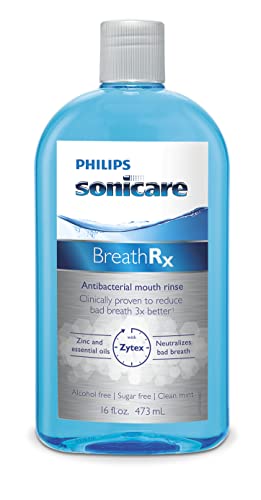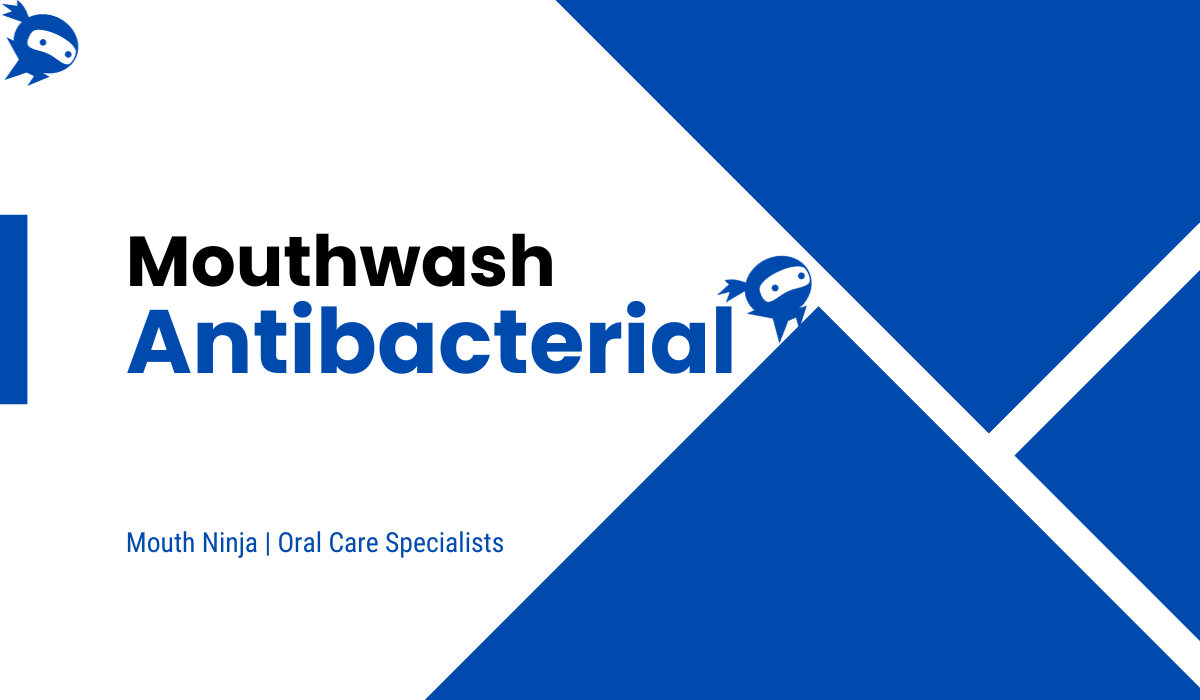Oral hygiene is an important aspect of our daily routine. Brushing and flossing your teeth are effective ways to maintain oral hygiene, but sometimes they aren’t enough to keep your breath fresh and your teeth free of plaque and bacteria.
This is where mouthwash comes in. Mouthwash, also known as oral rinse, is an antiseptic solution that helps to kill germs and bacteria in the mouth.

- Prevents plaque that leads to gingivitis
- Daily rinse with Zytex, alcohol free
- Dentist dispensed fresh breath system
- Zytex formula neutralizes bad breath and odor

- Mouth rinses cleanses and promotes healing of minor oral wounds
- Helps promote healing of: oral sores, irritations, mouth burns
- Oxygenating action removes oral debris to facilitate healing
- Antiseptic mouthwash, alcohol free formula
In this article, we’ll take a look at the best antibacterial mouthwash products on the market.
1. Colgate Peroxyl Antiseptic Mouthwash
Colgate Peroxyl Antiseptic Mouthwash is an oral rinse that contains hydrogen peroxide. It is designed to help clean and soothe oral tissues, reduce inflammation, and promote healing of mouth sores and ulcers.
Pros:
- Contains hydrogen peroxide to promote healing of mouth sores and ulcers
- Helps to clean and soothe oral tissues
- Can reduce inflammation
Cons:
- May cause a burning sensation in some people
- May not be as effective in reducing plaque and gingivitis as other mouthwashes
2. Philips Sonicare BreathRx Antibacterial Mouth Rinse
Philips Sonicare BreathRx Antibacterial Mouth Rinse is a highly effective mouthwash that kills bacteria and freshens breath. It contains cetylpyridinium chloride, which helps to reduce plaque and gingivitis. The mouthwash has a refreshing taste and is alcohol-free.
Pros:
- Highly effective in killing bacteria and freshening breath
- Contains cetylpyridinium chloride to reduce plaque and gingivitis
- Alcohol-free
Cons:
- May cause a burning sensation in some people
- Some people may find it too strong or harsh in taste.
3. Listerine Antiseptic Mouthwash
Listerine is one of the most popular mouthwash brands on the market, and for good reason. It has been clinically proven to kill 99.9% of germs that cause bad breath, plaque, and gingivitis. Listerine has a strong, refreshing taste that leaves your mouth feeling clean and fresh.
Pros:
- Highly effective in killing germs and bacteria
- Clinically proven to reduce bad breath, plaque, and gingivitis
- Leaves mouth feeling clean and fresh
Cons:
- Taste may be too strong and harsh for some people
4. Crest Pro-Health Clinical Mouthwash
Crest Pro-Health Clinical Mouthwash is another popular antibacterial mouthwash that is highly effective in reducing plaque and gingivitis.
It contains fluoride, which helps to strengthen teeth and prevent cavities. The mouthwash also has a pleasant taste, which makes it easy to use on a daily basis.
Pros:
- Highly effective in reducing plaque and gingivitis
- Contains fluoride to strengthen teeth and prevent cavities
- Pleasant taste
Cons:
- Some people may find it too sweet
5. Colgate Total Advanced Pro-Shield Mouthwash
Colgate Total Advanced Pro-Shield Mouthwash is another highly effective antibacterial mouthwash that helps to kill germs and bacteria in the mouth. It has a refreshing taste and helps to prevent bad breath, plaque, and gingivitis.
Pros:
- Highly effective in killing germs and bacteria
- Helps to prevent bad breath, plaque, and gingivitis
- Refreshing taste
Cons:
- May cause a burning sensation in some people
6. ACT Anticavity Fluoride Mouthwash
ACT Anticavity Fluoride Mouthwash is a great choice for those who are looking for a mouthwash that not only kills germs and bacteria but also helps to prevent cavities.
It contains fluoride, which helps to strengthen teeth and prevent cavities. The mouthwash has a mild, pleasant taste and is easy to use.
Pros:
- Contains fluoride to strengthen teeth and prevent cavities
- Mild, pleasant taste
- Highly effective in killing germs and bacteria
Cons:
- May not be as effective in reducing plaque and gingivitis as other mouthwashes
7. TheraBreath Fresh Breath Oral Rinse
TheraBreath Fresh Breath Oral Rinse is a great choice for those who suffer from chronic bad breath. It contains a unique blend of ingredients that helps to neutralize bad breath and freshen breath.
The mouthwash is alcohol-free and has a mild, pleasant taste.
Pros:
- Highly effective in neutralizing bad breath
- Alcohol-free
- Mild, pleasant taste
Cons:
- May not be as effective in reducing plaque and gingivitis as other mouthwashes
8. Tom’s of Maine Wicked Fresh! Mouthwash
Tom’s of Maine Wicked Fresh! Mouthwash is a great choice for those who prefer natural products. It contains natural ingredients such as peppermint and tea tree
oil, which help to freshen breath and kill germs. The mouthwash has a refreshing taste and is free from artificial colors, flavors, and preservatives.
Pros:
- Contains natural ingredients
- Refreshing taste
- Free from artificial colors, flavors, and preservatives
Cons:
- May not be as effective in reducing plaque and gingivitis as other mouthwashes
9. Scope Original Mint Mouthwash
Scope Original Mint Mouthwash is a popular choice for those who prefer a more traditional mouthwash. It has a refreshing mint flavor and helps to kill germs and freshen breath. The mouthwash is alcohol-free and easy to use.
Pros:
- Refreshing mint flavor
- Alcohol-free
- Easy to use
Cons:
- May not be as effective in reducing plaque and gingivitis as other mouthwashes
Buying Guide: How To Choose An Antibacterial Mouthwash
Here’s a buying guide to help you choose the best antibacterial mouthwash for your needs:
- Effectiveness: Look for a mouthwash that is highly effective in killing germs and bacteria, reducing plaque and gingivitis, and preventing cavities. Check the label for information on the mouthwash’s active ingredients and look for clinical studies that support its effectiveness.
- Taste: Choose a mouthwash that has a taste you enjoy. Some mouthwashes have a strong, refreshing taste, while others have a mild, pleasant taste. Consider your personal preferences when choosing a mouthwash.
- Alcohol content: Some mouthwashes contain alcohol, which can cause a burning sensation in the mouth and may be drying to some people. If you have sensitive teeth or gums, look for an alcohol-free mouthwash.
- Natural ingredients: If you prefer natural products, look for a mouthwash that contains natural ingredients such as tea tree oil, peppermint, or aloe vera. These ingredients can be highly effective in killing germs and freshening breath.
- Price: Mouthwash prices can vary widely depending on the brand and size of the bottle. Consider your budget when choosing a mouthwash, but keep in mind that a higher price doesn’t necessarily mean better quality.
- Special needs: If you have specific oral health needs, such as chronic bad breath or sensitive teeth, look for a mouthwash that is formulated to address those needs. Some mouthwashes are designed to be gentle on sensitive teeth, while others are highly effective in neutralizing bad breath.
- Brand reputation: Consider the reputation of the brand when choosing a mouthwash. Look for brands that have a good track record of producing high-quality oral care products.
By considering these factors, you can choose the best antibacterial mouthwash for your needs and maintain optimal oral hygiene. Remember to always read the label and follow the instructions for use.
Conclusion
In conclusion, there are many great antibacterial mouthwash products on the market that can help to maintain oral hygiene and freshen breath.
It’s important to choose a mouthwash that fits your needs and preferences.
Some mouthwashes are highly effective in killing germs and reducing plaque and gingivitis, while others are better suited for those with chronic bad breath.
Consider the pros and cons of each product before making your decision, and always follow the instructions on the label.
FAQ
Antibacterial mouthwash is an oral rinse that contains ingredients that kill bacteria in the mouth. It is designed to help prevent gum disease, cavities, and bad breath.
Antibacterial mouthwash works by killing bacteria in the mouth. It can help to reduce plaque buildup, prevent gingivitis, and freshen breath.
No, not all mouthwashes are antibacterial. Some mouthwashes are designed to freshen breath or whiten teeth, while others are specifically formulated to kill bacteria in the mouth.
In some cases, antibacterial mouthwash can cause a burning sensation in the mouth or dryness. Some people may also be sensitive to certain ingredients in the mouthwash. If you experience any side effects, discontinue use and consult your dentist or healthcare provider.
You should use antibacterial mouthwash according to the instructions on the label. In general, it is recommended to use mouthwash twice a day after brushing and flossing.
No, antibacterial mouthwash cannot replace brushing and flossing. It is designed to be used in addition to regular brushing and flossing to help maintain oral hygiene.
It depends on the mouthwash and the child’s age. Some mouthwashes are not recommended for children under a certain age, so it is important to check the label and consult with a dentist or healthcare provider before giving mouthwash to a child.
Yes, antibacterial mouthwash can help to freshen breath by killing the bacteria that cause bad breath. However, if bad breath persists, it may be a sign of an underlying oral health issue and should be evaluated by a dentist or healthcare provider.


